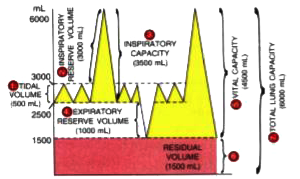Explain briefly the following:
Residual volume
Step-by-Step Solution:
1. Definition of Residual Volume: Residual volume (RV) is defined as the amount of air that remains in the lungs after a person has exhaled as forcefully as possible.
2. Importance of Residual Volume: This volume is crucial because it prevents the alveoli (the tiny air sacs in the lungs) from collapsing. It ensures that there is always some air in the lungs, which facilitates gas exchange even when a person is not actively breathing.
3. Characteristics of Residual Volume:
- Residual volume cannot be voluntarily expelled from the lungs.
- It remains relatively constant and does not change significantly with different breathing patterns or lung volumes during expiration.
4. Reference Values: The typical reference range for residual volume in adults is approximately 1 to 1.2 liters.
5. Factors Affecting Residual Volume: Although the reference values provide a general idea, residual volume can vary based on several factors, including:
- Age: As people age, their lung capacity and residual volume may change.
- Gender: Males generally have a higher residual volume compared to females.
- Height and Weight: Taller individuals may have larger lung capacities.
- Physical Activity: Active individuals may have different lung volumes compared to sedentary individuals.
- Residual volume cannot be voluntarily expelled from the lungs.
- It remains relatively constant and does not change significantly with different breathing patterns or lung volumes during expiration.
- Age: As people age, their lung capacity and residual volume may change.
- Gender: Males generally have a higher residual volume compared to females.
- Height and Weight: Taller individuals may have larger lung capacities.
- Physical Activity: Active individuals may have different lung volumes compared to sedentary individuals.
Topper's Solved these Questions
- RESPIRATORY SYSTEMBOOK - ICSECHAPTER - RESPIRATORY SYSTEMEXERCISE - TOPIC-2 (5 Marks Questions)
14 Videos
- RESPIRATORY SYSTEMBOOK - ICSECHAPTER - RESPIRATORY SYSTEMEXERCISE - TOPIC-2 (2 Marks Questions)
6 Videos
- RESPIRATION IN PLANTS BOOK - ICSECHAPTER - RESPIRATION IN PLANTS EXERCISE - 5 Mark Questions
36 Videos
- SEEDS - STRUCTURE AND GERMINATION BOOK - ICSECHAPTER - SEEDS - STRUCTURE AND GERMINATION EXERCISE - TOPIC 2 (3 Marks Questions )
5 Videos
Similar Questions
Knowledge Check
Residual volume is
AGreater than vital capacityBGreater than tidal volumeCLesser than tidal volumeDGreater than inspiration
The volume of air in the lungs and the rate at which it is exchanged during inspiration and expiration was measured.
The following diagram shows a group of the lung volumes and capacities :

Study the diagram carefully and explain briefly the following:
(a) Tidal volume
(b) Inspiratory reserve volume
(c) Expiratory reserve volume
(d) Vital capacity
(e) Residual volume
View SolutionExplain briefly the pollinium.
View SolutionExplain briefly the following:
Alveolar air
View SolutionExplain briefly the term poling.
View SolutionExplain briefly the following terms with suitable examples : sporophyll
View SolutionExplain briefly the following:
Total lung capacity
View SolutionExplain briefly :
Pulse.
View Solution
